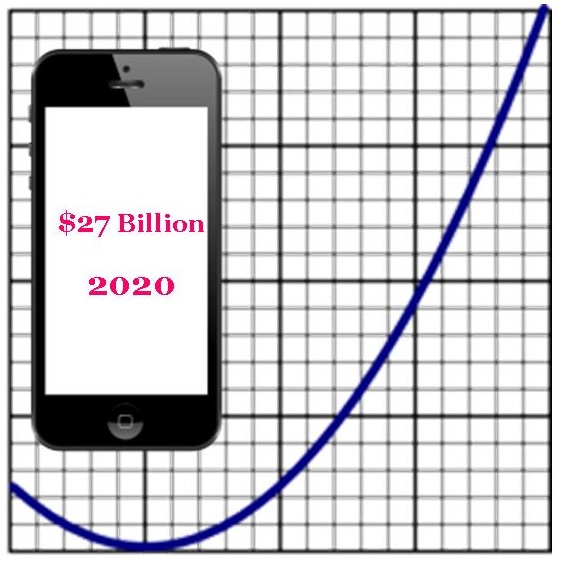The results of the study that was conducted by ReportsnReports are promising for the channel.
A new mobile marketing report has just been released, which indicates that the channel is now primed to produce tremendous revenue generation opportunities for app developers and others in the smartphone and tablet industry over the next few years.
It looked into several different areas and produced a number of projections for seven years of growth.
The mobile marketing report was called “The Mobile & Tablet Advertising Market: 2013-2020”. It suggest that the channel will be an important form of advertising for generating revenues for app developers, mobile platform providers, advertising networks and Mobile Network Operators (MNOs) over the next seven years.
At the moment, mobile marketing remains in its infancy, but it is now set to take off.
 Currently, as the mobile marketing space begins its popularity, it is responsible for approximately $17 billion in revenue every year. The increase in the penetration of smartphones and tablets has considerably increased the number of potential viewers of a given campaign. For that reason, companies are now starting to boost the advertising that they are creating for these devices that are taking an ever larger amount of a user’s time every day.
Currently, as the mobile marketing space begins its popularity, it is responsible for approximately $17 billion in revenue every year. The increase in the penetration of smartphones and tablets has considerably increased the number of potential viewers of a given campaign. For that reason, companies are now starting to boost the advertising that they are creating for these devices that are taking an ever larger amount of a user’s time every day.
The ReportsnReports.com study indicates that by the end of 2020, advertising over tablets alone will bring in over $27 billion in revenues worldwide. This will follow a CAGR from 2013 to 2020 of almost 30 percent.
Additional key findings within this mobile commerce report include:
• Growth in click through rates and increased user penetration will cause the tablet segment to overtake the mobile marketing revenues generated by smartphones.
• Once 2020 comes to a close, tablet advertising is expected to bring in over $27 billion in revenue worldwide, and there will be almost 600 million tablet shipments per year.
• Mobile marketing over video will outperform all other categories of apps in terms of the rate of growth. From 2013 to 2020, it will grow at an almost 23% CAGR and revenues from the advertising will make up about $5 billion in that last year.
Mobile commerce may have a role to play in company’s future
Alibaba is one of the largest e-commerce businesses in the world and currently dominates the Chinese market. As a native to China, Alibaba was able to succeed in establishing itself as the country’s premier e-commerce businesses due to the lack of competition coming from companies like Amazon and eBay, which had been almost entirely exclusive to western societies in the past. In May of this year, Jack Ma, the company’s founder, stepped down as CEO of Alibaba and was succeeded by Jonathan Lu. Lu has remained relatively reserved concerning the future of the company, but believes that it must adapt in order to retain its leadership in the e-commerce sector, and that means growing more accommodating of mobile commerce.
Competition could force more focus on mobile services
Jonathan Lu and Jack Ma share a many of the same ideologies when it comes to e-commerce and business. Both have been working together for several years and both have taken note of the rising importance that mobile commerce is playing among consumers. With more people beginning to rely heavily on mobile devices, the need for Alibaba to provide comprehensive mobile commerce services to these consumers is becoming too important to ignore. This is especially true as both Amazon and eBay look to provide such services to consumers and find some foothold in the Chinese market.
Alibaba expected to go public in near future
 Alibaba already has some mobile payment platforms in place, but the company is beginning to feel pressure to become more aggressive on this front, especially if it plans to go public in the relatively near future. Since 1999, Alibaba has been a privately owned company, but that is likely to change in the coming years under Lu’s leadership. If the company where to go public, its approach on mobile commerce could generate a great deal of traction with investors due to the popularity of mobile technology and mobile-centric services.
Alibaba already has some mobile payment platforms in place, but the company is beginning to feel pressure to become more aggressive on this front, especially if it plans to go public in the relatively near future. Since 1999, Alibaba has been a privately owned company, but that is likely to change in the coming years under Lu’s leadership. If the company where to go public, its approach on mobile commerce could generate a great deal of traction with investors due to the popularity of mobile technology and mobile-centric services.
Public offering has not yet been announced
Lu has thus far only alluded to Alibaba going public in the future. Before the company launches a public offering, it is likely to take steps to ensure that its mobile commerce foundation is well suited to the current needs of the market. This in itself could be a time consuming endeavor due to the changing interests of consumers and the increasingly problematic security issues that exist within the mobile commerce field.
 Currently, as the mobile marketing space begins its popularity, it is responsible for approximately $17 billion in revenue every year. The increase in the penetration of smartphones and tablets has considerably increased the number of potential viewers of a given campaign. For that reason, companies are now starting to boost the advertising that they are creating for these devices that are taking an ever larger amount of a user’s time every day.
Currently, as the mobile marketing space begins its popularity, it is responsible for approximately $17 billion in revenue every year. The increase in the penetration of smartphones and tablets has considerably increased the number of potential viewers of a given campaign. For that reason, companies are now starting to boost the advertising that they are creating for these devices that are taking an ever larger amount of a user’s time every day.
 Alibaba already has some mobile payment platforms in place, but the company is beginning to feel pressure to become more aggressive on this front, especially if it plans to go public in the relatively near future. Since 1999, Alibaba has been a privately owned company, but that is likely to change in the coming years under Lu’s leadership. If the company where to go public, its approach on mobile commerce could generate a great deal of traction with investors due to the popularity of mobile technology and mobile-centric services.
Alibaba already has some mobile payment platforms in place, but the company is beginning to feel pressure to become more aggressive on this front, especially if it plans to go public in the relatively near future. Since 1999, Alibaba has been a privately owned company, but that is likely to change in the coming years under Lu’s leadership. If the company where to go public, its approach on mobile commerce could generate a great deal of traction with investors due to the popularity of mobile technology and mobile-centric services.